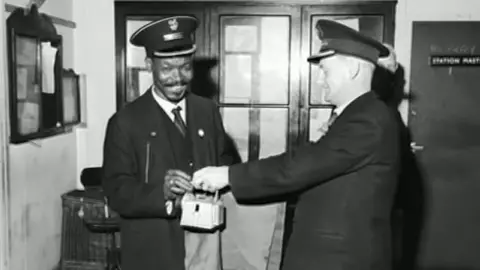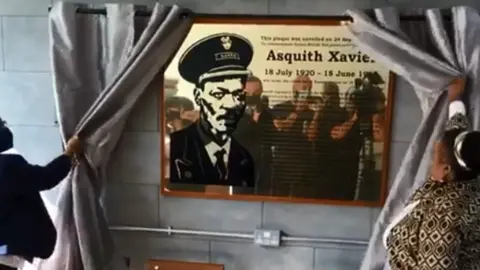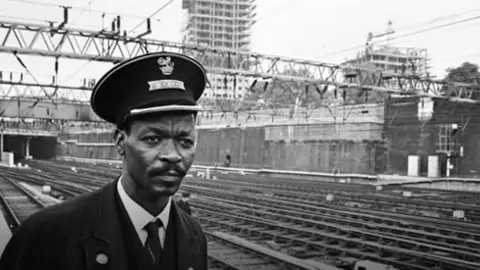Asquith Xavier: Plaque honours train guard who fought Whites-only policy
 Getty Images
Getty ImagesA plaque to honour a railway worker who overturned a whites-only recruitment policy in the 1960s has been unveiled.
Asquith Xavier, already an experienced guard when he arrived in England from Dominica, had initially been refused a job at Euston station.
After negotiations with the National Union of Railwaymen, British Railways announced no grade would be closed on racial grounds in the London division.
In August 1966 Mr Xavier was allowed to start work at Euston.
The plaque, installed in Chatham, Kent, where Mr Xavier lived, would be a "place where the general public can learn of an ordinary man who achieved extraordinary things," his granddaughter Camealia said.
Whites-only policy
Mr Xavier, who died in 1980, was part of the Windrush generation, moving to England after World War Two.
In 1966 he was working as a guard at Marylebone Station, having started as a porter 10 years earlier.
The closure of the Marylebone main line as part of the Beeching rail cuts meant guards were no longer required and were being transferred to other London stations.

Mr Xavier applied for a promotion at Euston, where guards were paid an extra £10 a week.
But he received a letter from management telling him that his application had been rejected.
At the time the station was operating a whites-only recruitment policy.
Mr Xavier demanded change and his story made its way to Parliament, and the then Secretary of State for Transport Barbara Castle.
As a result of his action, on 15 July 1966 British Railways announced the racist recruitment policy had been scrapped.
 Getty Images
Getty ImagesCamealia said the plaque has helped to "shed light" on her grandfather's "achievements within British race relations and employment law".
"It recognises how my grandfather overcame adversity and prejudice in the campaign for racial equality in Britain in the 1960s and acknowledges his legacy as part of modern-day history."
Mick Cash, general secretary of the Rail, Maritime and Transport union, said: "We owe so much to those who challenged racism on the railway in an era when it was all-pervasive."

Follow BBC South East on Facebook, on Twitter, and on Instagram. Send your story ideas to [email protected].
